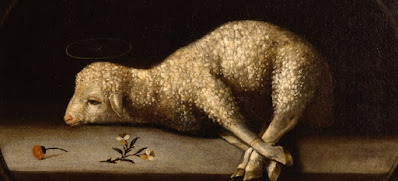Good Friday
The Collect
A |
LMIGHTY God, we beseech thee graciously to behold this thy family, for which our Lord Jesus Christ was contented to be betrayed, and given up into the hands of wicked men, and to suffer death upon the cross; who now liveth and reigneth with thee and the Holy Ghost ever, one God, world without end. Amen.
F |
OR the law having a shadow of good things to come, and not the very image of the things, can never with those sacrifices which they offered year by year continually make the comers thereunto perfect. 2 For then would they not have ceased to be offered? because that the worshippers once purged should have had no more conscience of sins. 3 But in those sacrifices there is a remembrance again made of sins every year. 4 For it is not possible that the blood of bulls and of goats should take away sins. 5 Wherefore when he cometh into the world, he saith, Sacrifice and offering thou wouldest not, but a body hast thou prepared me: 6 In burnt offerings and sacrifices for sin thou hast had no pleasure. (Heb 10:1-6 (KJV)
There are two occasions on which God Himself made a blood sacrifice as a covering for our sins - the first was the sacrifice of a perfectly innocent animal (probably a lamb) in the Garden at Eden as a symbolic covering for the sin (nakedness) of our first parents. The second was the blood sacrifice of the Father’s only Begotten Son at Golgotha.
The hands of men are not capable of any worthy work or sacrifice pleasing to God, so God sacrificed His own Son, the Lamb of God, without spot or blemish for the sins of His Elect. The sacrifice was made on the same day that our Lord partook of the Passover meal on the same day as the Passover sacrifice. The Last Supper was the evening before the crucifixion, and the day began at sunset on Thursday (beginning of Friday on Jewish calendar) and ended at sunset on Friday according to the Hebrew calculation of days. We are reminded of this calculation in the first days of Creation: 3 And God said, Let there be light: and there was light. 4 And God saw the light, that it was good: and God divided the light from the darkness. 5 And God called the light Day, and the darkness he called Night. And the evening and the morning were the first day. (Gen 1:3-5)
Abraham, by faith, made sacrifices to God of lambs and goats, but those sacrifices availed nothing regarding the forgiveness of sin – it was Abraham’s faith in the promises of God that were symbolized in those acts of sacrifice. As Abraham told his inquiring son at the base of Mount Moriah, My son, God will provide himself a lamb for a burnt offering: so they went both of them together. (Gen 22:8) And in the fulness of time, God did provide the only worthy sacrifice possible as a covering for our sins – His own Son. Just as did Isaac, our Lord Jesus Christ never wavered before the Sanhedrin, before Pilate, on the Via Dolorosa, nor at the lifting up on the cross between Heaven and earth. His human courage could have failed had it not been for the bountiful Fountain of Love springing up as a river in the Heart that bled for us.
No sacrifice of man can assuage the wrath of God engendered by sin – only a Holy and Divine Sacrifice could accomplish the redemption of sin and provide a means of reconciliation to God for lost man. Unfortunately, many will never know that forgiveness for they are depending upon their own good works for salvation to please God.
This Good Friday, let is remember that it was our sins and wickedness that compelled God’s sacrifice for for His chosen – not simply the Roman cohort, the Roman Proconsul, or the Jewish rulers who cried for his crucifixion – it was you and me.
